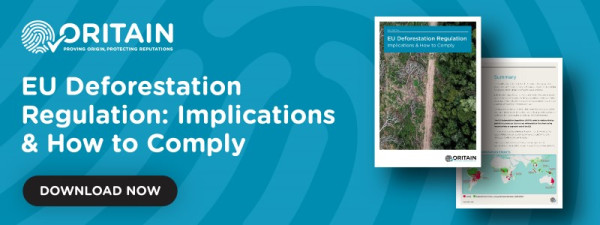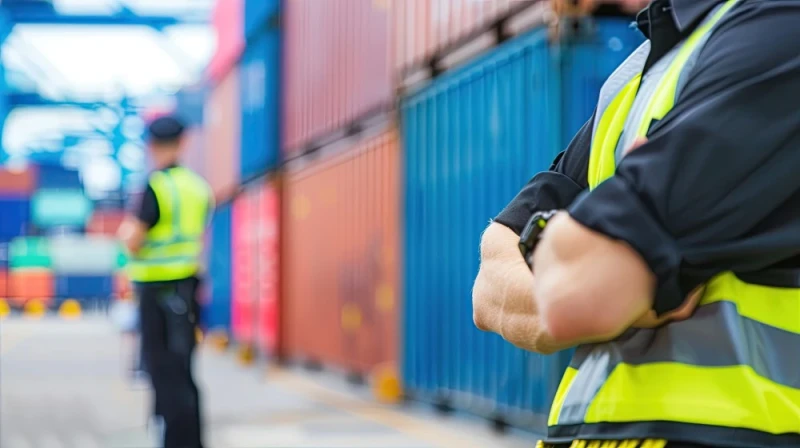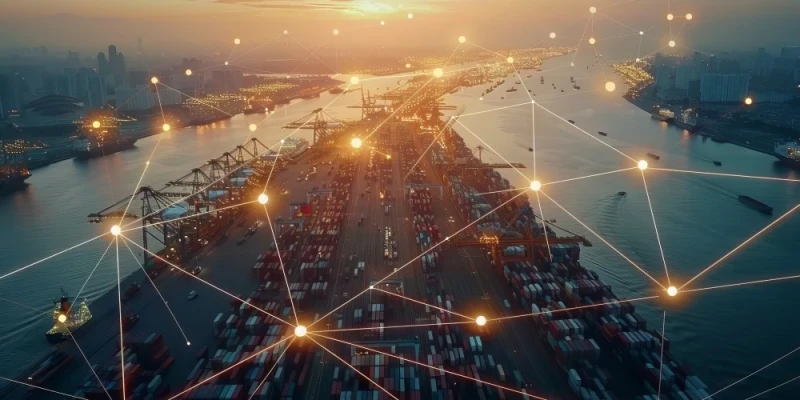How Scientific Verification Ensures EUDR Compliance & Deforestation-Free Supply Chains
By Michela Mossali | 29 August 2024
minutes to read.
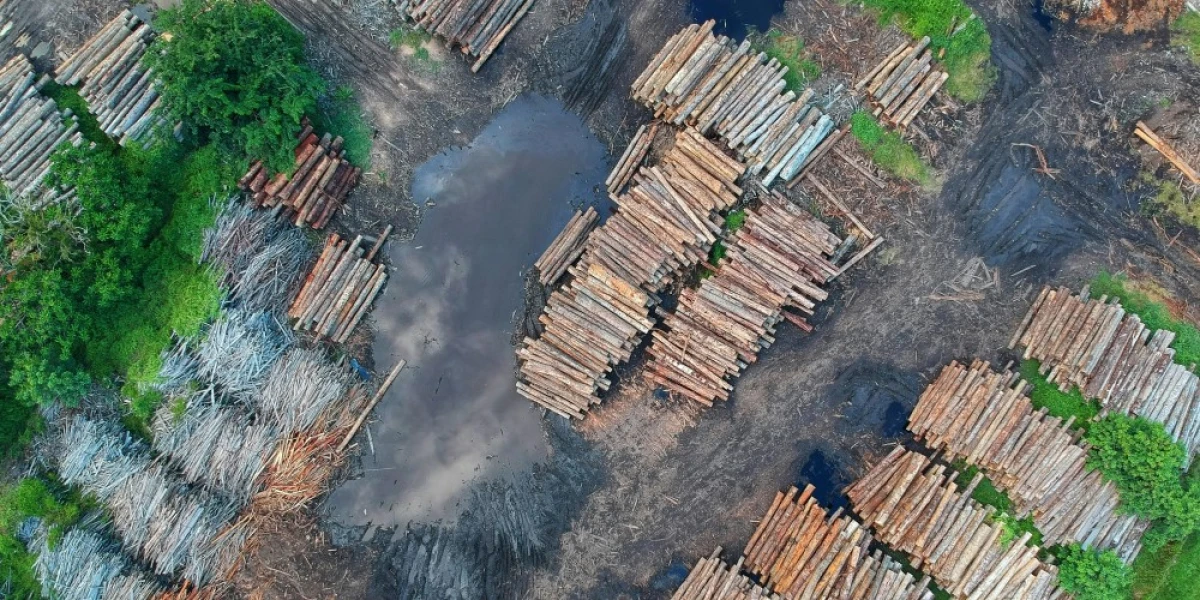
Updated 8 December 2025
The EU Deforestation Regulation begins enforcement from the end of 2026. Operators and traders in the industries of coffee, cattle, cocoa, wood, rubber, palm and soy have until then to ensure their products comply with the legislation.
If they fail to do so, they risk significant penalties including fines of at least 4% of EU turnover, prevention of product sale, and reputational damage.
From this time, only products from land that hasn’t been degraded or deforested after December 31st, 2020, will be permitted for import into or exported from the EU market.
The legislation mandates a process of due diligence for all businesses in affected industries. Scientific product origin verification provides an important tool to enable and demonstrate compliance.
EUDR due diligence: Why origin verification matters
Due diligence statements are a critical part of the activities that businesses must undertake to determine that their products are deforestation-free.
These statements must include the country of production for their commodities and geodata coordinates of the plots they originate from, as well as a risk assessment evaluation.
The regulation states that companies must demonstrate “that the absence of deforestation and forest degradation and legality requirements are fulfilled, by identifying the country of production or parts thereof and including the geolocation coordinates of relevant plots of land.”
Businesses must therefore collect information to support the claims made in their statements, before submitting these through the public information system.
Since enforcement authorities will be checking the due diligence statements submitted, it’s essential that companies ensure the information they provide is accurate to avoid penalties. If the information is inaccurate or insufficient, and businesses thus cannot prove where their products originate from, they cannot prove compliance – and thus potentially lose the ability to import.
Product origin verification helps companies mitigate the risk of supply chain disruption, product seizures, or lost EU market access.
To ensure EUDR compliance, and build deforestation-free supply chains, it’s imperative that businesses can prove the origin of their products.
Mapping complex supply chains for EUDR compliance
Meeting these requirements becomes more challenging when the origin of the product is unknown, or where companies are dealing with very complex supply chains with multiple actors involved. This could include situations involving commodities like coffee, palm or cocoa that are often mixed or blended, and where the risk of these being blended with commodities originating from risk area is higher and definitively proving the origin is difficult.
To achieve EUDR compliance and reduce supply chain risk, especially in cases like these, it’s essential to accurately map supply chains to gather information and ensure that the information provided by suppliers and other partners is correct.
The key to this is accuracy. Providing incorrect geolocation details would constitute a breach of the regulation. Relying on vendor self-declarations or paper trails alone is unlikely to be enough.
Indeed, the EUDR specifically focuses on “document and data falsification” in the verification of origin, particularly where such fraud is being carried out deliberately to circumvent the legislation.
Many companies will have little visibility over their broader supply chains, and when they know they may be sourcing from high-risk areas (that is, countries with deforested areas), a reliable, accurate solution for product traceability will be essential.

The role of scientific evidence in EUDR verification
The importance of scientific evidence is a common thread running throughout the wording of the EUDR. For example:
- Assessments of forest degradation must be “based on the most up-to-date scientific data” and “in consultation with the scientific community”.
- The classification of risk levels for countries will be made “taking into account the latest scientific evidence”.
- One of the objectives of the regulation is to promote “sustainable forest management… based on science-based indicators”.
Therefore, employing science-based tools as part of a company’s risk assessment and risk mitigation efforts demonstrates strong alignment with the spirit and provisions of the legislation.
Enforcement authorities will be using several tools, including chemical analyses, as part of their checking of submitted due diligence statements.
The regulation states that checks may include “any technical and scientific means adequate to determine the species or the exact place where the relevant commodity or relevant product was produced, including anatomical, chemical or DNA analysis.”
Using similar techniques to prove country of origin will put businesses in a position of advantage as they will be able to demonstrate compliance to authorities if their operations are brought into question.
Forensic science: A reliable path to EUDR compliance
Forensic origin verification is an established, trusted method of substantiating product origin information. It offers a more robust and reliable solution than many traditional or digital traceability tools.
Oritain’s innovative forensic science tests products and raw materials to verify their origin – a key requirement of EUDR due diligence requirements. Commodities falling under the scope of the EUDR can be audited in this way.
For example, coffee brands can verify the precise growing regions their beans are sourced from. Fashion houses have assurance that their leather goods are deforestation-free.
By analyzing samples of the products, Oritain can audit at different stages of the supply chain and at different resolutions, to enable companies to verify the information that the EUDR requires. In this way, Oritain provides a forensic path to compliance.
The scientific precision of these tests mitigates the risk for companies that believe they’re procuring an EUDR-compliant commodity, only to discover it’s sourced from a deforested area.
Forensic science is also less susceptible to the fraud or inaccuracy found in conventional traceability systems and digital tools such as blockchain, where the value of the due diligence statements produced are only as good as the information entered into them. Incorrect information going in results in noncompliant statements coming out.
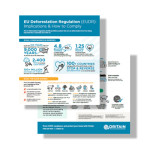
Free download: EU Deforestation Regulation Infographic
Get all the key features of the EUDR plus the scale of the issue in our free infographic.
Oritain’s scientific platform aligns to EUDR requirements and provides reliable protection for businesses operating in the EU. In helping ensure they comply with the legislation, it also supports:
- Avoiding noncompliance penalties, product seizures and restrictions of trade
- Improving oversight of and relationships with supply chain partners
- Strengthening business reputation among regulators, investors and consumers
With implementation of the EUDR imminent, it’s contingent on companies to protect themselves with the most reliable solution available.
To learn more about how Oritain’s scientific verification can help your business comply with the EUDR, contact us to speak with one of our team.
Disclaimer: The information provided in this document does not and is not intended to constitute legal advice. Instead, all information presented here is for general informational purposes only. Counsel should be consulted with respect to any particular legal situation.
